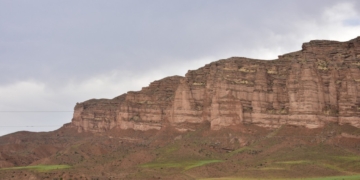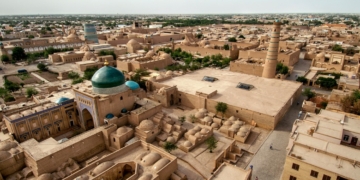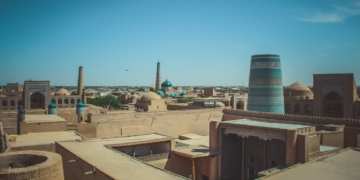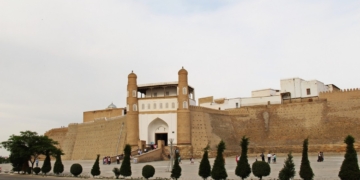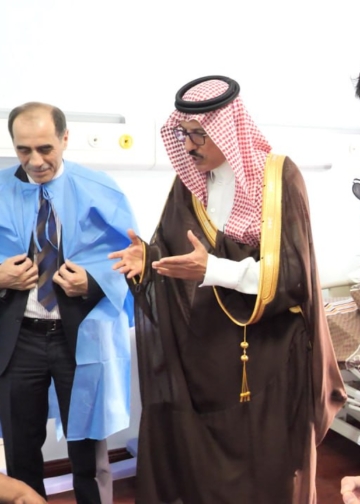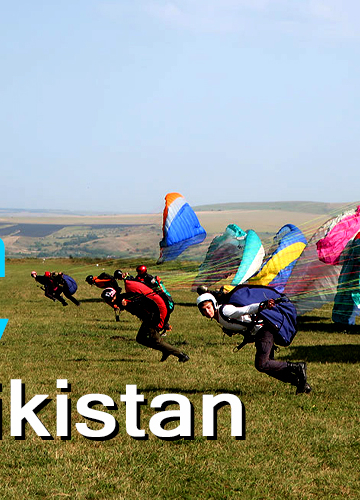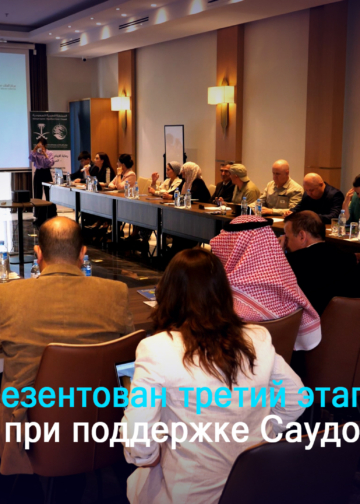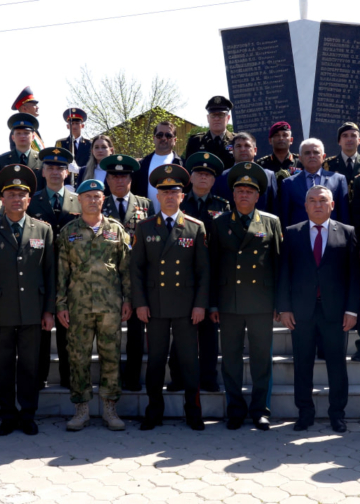id: 227616
date: 9/30/2009 11:08
refid: 09DUSHANBE1112
origin: Embassy Dushanbe
classification: UNCLASSIFIED//FOR OFFICIAL USE ONLY
destination: 09DUSHANBE932
header:
VZCZCXRO7852
RR RUEHLN RUEHSK RUEHVK RUEHYG
DE RUEHDBU #1112/01 2731108
ZNR UUUUU ZZH
R 301108Z SEP 09
FM AMEMBASSY DUSHANBE
TO RUEHC/SECSTATE WASHDC 0778
INFO RUCNCIS/CIS COLLECTIVE
RUEHBUL/AMEMBASSY KABUL 0254
RUCPDOC/DEPT OF COMMERCE WASHINGTON DC
RUEHDBU/AMEMBASSY DUSHANBE 1638
—————— header ends —————-
UNCLAS SECTION 01 OF 02 DUSHANBE 001112
SENSITIVE
SIPDIS
DEPARTMENT FOR SCA/CEN
E.O. 12958: N/A
TAGS: ECON, ETRD, PGOV, EAIR, TI
SUBJECT: TAJIKISTAN — BOEING MAKES A DEAL WITH SOMON AIR
REF: DUSHANBE 932
DUSHANBE 00001112 001.2 OF 002
1. (SBU) Summary: Boeing has
reached an agreement with Somon
Air (which is controlled by the President and his family), to
provide Somon Air up to six 737 aircraft by 2012. With the
aircraft, Boeing will provide a comprehensive package of
training for Somon pilots and maintenance staff and analytical
support to develop Somon’s routes and company structure. Somon
says it will expand its routes considerably with these aircraft.
Somon Air seems to be in the
process of replacing state-owned
Tajik Air, which would presumably go out of business when Somon
Air becomes large enough to take over its traffic. End Summary.
2. (SBU) Boeing Vice President for Middle East and Africa Marty
Bentrott called on Ambassador September 30, accompanied by
Jamshed Rahmonberdiev of Somon Capital, to discuss Boeing’s new
relationship with Somon Air.
Boeing will sell two 737s to
Somon, and will deliver them in two years. Somon will lease
two, and possibly up to four more 737s by 2012. Somon already
operates two 737-800s. Somon is
entering into a comprehensive
relationship with Boeing, which will include training of
maintenance and flight crews, and assistance to develop routes
and marketing relationships.
AS ALWAYS IN TAJIKISTAN, BIG PLANS
3. (SBU) Rahmonberdiev, of Somon Capital, said Somon air would
expand its routes to Istanbul and Riga in the next month, later
start service to several cities in Russia, and is negotiating
with Chinese authorities to start service to Urumqi. They are
also considering flights to South Asia and Bangkok. Expanded
service within central Asia was less interesting to them,
because of low demand and Tajik Air’s present regulatory
monopoly.
4. (SBU) Rahmonberdiev and Bentrott noted that the airplanes
bought directly from Boeing would be financed and would cost
less that the two 737s Somon bought last year from other owners.
Somon Capital paid cash for those
two planes, did not do its
homework, and found itself with planes that needed expensive and
time consuming reconfigurations.
They also lacked technical
support, forcing Somon to engage Turkish Air in an expensive
support contract.
5. (SBU) Bentrott said that a Boeing representative would likely
come to live in Dushanbe closer to the delivery date to ease
communications between Somon and Boeing. Next year Somon would
send about 60 pilots and technicians to Seattle for training on
the 737. In the near term, Somon
Capital will visit Washington,
D.C. and Seattle in late October and will want to meet with
EximBank to discuss possible support from EximBank for this deal.
6. (SBU) No one from Somon Air itself came to the meeting.
Somon Air is owned by OrionBank, controlled by the President and
run by his brother-in-law. Somon
Capital, half-owned by
OrionBank, is contracted to handle all financial dealing for new
aircraft for Somon Air, while the air company only operates the
aircraft. Rahmonberdiev, the CEO
of Somon Capital, was
previously the embassy’s commercial FSN and attended secondary
school in the United States under the FLEX program. Somon Air’s
management comes with long experience at Tajik Air and is
reportedly unfamiliar with western business practices.
COMMENT: SLIGHTLY LESS STUPID, AS CORRUPT AS EVER
7. (SBU) Somon Air has been a comedy of errors, reflective of
political interference and the slavish need, which permeates
Tajik business and government, to instantly and unquestioningly
gratify every presidential whim.
Last year Somon Air hastily
bought two aircraft, one new and the other barely used, to
satisfy a political priority to establish a private airline.
Thinking about aircraft internal configuration, engine software,
training, and maintenance all came later. Predictably the
DUSHANBE 00001112 002.2 OF 002
aircraft proved more expensive and difficult to operate than
foreseen. Somon had to turn to
Turkish Air to fly and maintain
them. They seem now to be trying
the old fashioned way, working
with Boeing to develop a plan and the planes and people to carry
out that plan. The scale of
Somon’s planned expansion indicates
that as in Kazakhstan, the new «private» airline will supplant
the existing state carrier, which will presumably then go
bankrupt. Even in these
economically difficult times, finding
the money for all this seems not to be a problem. The President
and his close associates control Somon Air but, as Rahmonberdiev
has told us, the money to buy the airplanes comes from the
financially opaque and ostensibly state-owned Tajik Aluminum
Company. End Comment.
GROSS
=======================CABLE ENDS============================
id: 227973
date: 10/2/2009 4:46
refid: 09DUSHANBE1113
origin: Embassy Dushanbe
classification: UNCLASSIFIED//FOR OFFICIAL USE ONLY
destination: 09DUSHANBE877
header:
VZCZCXRO9751
RR RUEHLN RUEHSK RUEHVK RUEHYG
DE RUEHDBU #1113/01 2750446
ZNR UUUUU ZZH
R 020446Z OCT 09
FM AMEMBASSY DUSHANBE
TO RUEHC/SECSTATE WASHDC 0780
INFO RUCNCIS/CIS COLLECTIVE
RUEHBUL/AMEMBASSY KABUL 0256
RUCPDOC/DEPT OF COMMERCE WASHINGTON DC
RUEATRS/DEPT OF TREASURY WASHINGTON DC
RUEHDBU/AMEMBASSY DUSHANBE 1640
—————— header ends —————-
UNCLAS SECTION 01 OF 03 DUSHANBE 001113
SENSITIVE
SIPDIS
DEPT FOR SCA/CEN
E.O. 12958: N/A
TAGS: EAID, ECON, EINV, PREL, TI
SUBJECT: TAJIKISTAN NAMED TOP REGULATORY REFORMER — NOW FOURTH-WORST
IN ASIA
REF: DUSHANBE 877
DUSHANBE 00001113 001.2 OF 003
1. (SBU) Summary: Tajikistan has
been named a «top 10
regulatory reformer» by the World Bank and International Finance
Corporation (IFC), after improving in five of the ten areas the
Bank uses to compute its annual «Doing Business» rankings.
Tajikistan now ranks 152 out of 183 countries, up from 159 out
of 181 countries last year. It
remains the fourth worst country
in Asia for business.
Improvements were made in the categories
«protecting investors,» «ease of getting credit,»
«starting a
business,» «closing a business,» and «dealing with
construction
permits.» According to an
IFC economist here, some improvements
are genuine, but others are only skin deep. She disputed some
of the conclusions reached by the Doing Business assessment team.
2. (SBU) Summary continued: The
single biggest improvement this
year came too late to be considered in the rankings. With
assistance from USAID, Tajikistan has implemented a
comprehensive single window business registration process. The
new process, after being unexpectedly rolled out six months
earlier than originally planned, is doing well, according to an
EU-funded consultant. It reduces
the cost of registering a new
business by over 90% and the time by well over a month. There
remain some challenges, including squabbling government
ministries, technical difficulties, and a Soviet-era
predilection for demanding more documentation from applicants
than is legally required. End
summary.
MOVING ON UP?
3. (U) Tajikistan recently was named one of the world’s «top 10
regulatory reformers» this year by the World Bank and the
International Finance Corporation (IFC).
The two organizations,
members of the World Bank Group, collaborate on the annual
«Doing Business» rankings that assess countries’ regulatory
and
business environments. Tajikistan
improved in five of the ten
areas examined by the Doing Business team, lifting its overall
ranking twelve spots to 152 out of 183 countries surveyed.
(Note: Last year Tajikistan
ranked 159 out of 181 countries.
That ranking was (confusingly) recalibrated this year to 164 out
of 183, allegedly to provide comparability with this year’s
rankings. End note.) Several key reforms were enacted with
USAID assistance.
4. (U) Tajikistan’s improvement in the rankings was the result
of a targeted effort to craft reforms addressing the specific
categories examined by the World Bank Group. Tajikistan
improved in the «Starting a Business» category by reducing the
minimum capital requirement for new business from 8,000 to 500
somoni ($1,805 to $113). The
government did not receive credit
in this year’s rankings, however, for its most heralded reform,
the establishment on July 1 of a single-window business
registration process (ref A).
Before the change, applicants had
to register with at least four, and often several more, separate
state agencies, and were frequently forced to pay bribes to make
their way through the byzantine process.
The new system went
into effect too late to be included in the rankings and will
likely be reflected in next year’s assessment, according to
Christine Bowers, an economist with the IFC.
5. (U) Tajikistan’s largest increase in the rankings occurred in
the «Protecting Investors» category. The government amended the
joint stock company act making it easier for shareholders to sue
company leadership by reducing the ownership threshold. It also
established more stringent conflict of interest rules by adding
to disclosure requirements. Both
changes were supported with
extensive technical assistance by USAID.
Tajikistan also moved
up in the «Ease of Getting Credit» category by passing a law
on
credit histories. This provides
for the possibility of opening
a private credit bureau in the future.
To move any further in
the rankings, not only must a credit bureau be established, but
a certain percentage of the population must actually be
registered with the bureau.
According to Bowers, however,
Tajikistan is at least five years away from this point.
6. (SBU) In the «Closing a Business» category, another
USAID-supported reform made it easier for companies to declare
bankruptcy. Tajikistan’s
bankruptcy procedures have been so
difficult that many companies remained on the books long after
becoming defunct, unnecessarily tying up the country’s meager
productive assets that might be used for new endeavors,
according to Bowers. However, she
was not convinced the new law
should have been considered in this year’s rankings because it
had not yet been implemented.
According to the «Doing Business»
rules, a change must be implemented before being counted.
Bowers had a similar complaint about the fifth and final reform,
in the «Dealing with Construction Permits» category, saying
DUSHANBE 00001113 002.2 OF 003
that, as far as she could tell, there was no change whatsoever.
According to a USAID implementer on the project, however, eight
of eleven envisioned changes have been made in the permitting
legislation, and once the final three are complete, applicants
should begin to see differences.
BUT WHAT HAS REALLY CHANGED?
7. (SBU) Although several reforms for which Tajikistan was
credited appeared to be serious, others were more questionable.
For this reason, Bowers said she had the uneasy feeling that the
World Bank team may have stacked the deck stacked ahead of time
in Tajikistan’s favor — possibly to reward the country for
finally explicitly addressing the Doing Business indicators.
Regardless, she thought the overall ranking was about right, and
noted that despite its «top 10» reformer status, it was still
the fourth-lowest country in Asia, just ahead of Iraq (153rd),
Afghanistan (160th), and Laos (167th).
(Note: North Korea is
not on the index. So maybe
Tajikistan is fifth. End note.)
She expressed mystification that Kyrgyzstan came in 41st in this
year’s survey. While Bishkek had
certainly had a head-start and
spent more time enacting reforms, the structural differences
between Tajikistan and Kyrgyzstan were hardly large enough to
separate the two countries by 111 places in the rankings.
AFTER SOME HICCUPS, PROGRESS ON SINGLE WINDOW SYSTEM
8. (SBU) The single-window registration process, developed with
assistance from USAID and the European Union, went into effect
on July 1 of this year. USAID’s
Business Environment
Improvement (BEI) project helped develop the legal framework for
the new registration system, while the EU has been developing
the technological capacity through a one million Euro grant.
According to Arthur Luke, the EU’s consultant on the project,
the new process was originally supposed to take effect in
January 2010. This April,
however, the President abruptly
announced that the single window would be up and running by July
1. Luke’s team, which had not
been consulted, was thrown into a
panic. They ultimately were able
to inaugurate the new
registration system on time, but continue to work through some
difficulties.
9. (U) Before the single-window went into effect, applicants for
business licenses faced a byzantine registration process. At a
minimum, forms had to be filed with four government agencies:
the Tax Committee, the Ministry of Justice, the Ministry of
Labor and Social Protection, and the State Statistical
Committee. A separate
registration number was received from
each. In many cases, for instance
where the prospective
business dealt with food, medicine, or other restricted
products, a number of other agencies were involved. The
business registration process took months to complete and
exposed applicants to numerous officials who sought bribes along
the way. The new single-window system
is housed in the Tax
Committee. When an applicant
registers, the Committee is
required to distribute the relevant information electronically
to the other government agencies involved in the process.
Applicants are required to receive their registration numbers
within five working days; Luke said most should be processed
right away. If after five days an
applicant has not heard from
the Tax Committee, the presumption is that the business is
registered.
HERDING CATS, MAKING OFFICIALS PLAY NICE, AND OTHER CHALLENGES
10. (U) In a country with rudimentary technology, a lack of
expertise among government officials, and endemic electricity
shortages, a key challenge has been to develop the electronic
network necessary to process and keep track of applicants. The
EU team had to think of things that would not be necessary in
other countries. For example, not
only did computers and
Internet connections need to be set up in each of the Tax
Committee’s 68 regional offices, but generators had to be
supplied as well, otherwise the system would be useless during
the country’s frequent power outages.
As of mid-September, 50
branch offices were up and running.
The EU team had to work
quickly to train staff to meet the July 1 deadline. They began
by training 14 Tax Committee officials, who then immediately
passed their knowledge along to a further 80 officials.
11. (SBU) Luke said there had been several challenges, many
associated with the speeded-up start date. Training has so far
been inadequate, and government officials are not yet able to
process registrations according to regulations. There is a
mentality issue as well:
officials sometimes demand documents
that are not required by the new legislation, and the «silence
DUSHANBE 00001113 003.2 OF 003
is consent» presumption that businesses are automatically
registered unless there is a specific complaint is difficult for
some to get their minds around.
Also, in the old system, banks
demanded a registration number from the State Statistical
Committee before allowing businesses to open an account. While
the new Tax Committee number is all that is now legally
required, some banks have been reluctant to open accounts with
this number alone. For now, some
continue to apply for
Statistical Committee numbers, whether due to a lack of
knowledge about the new system or to cover their bases in this
interim period.
12. (SBU) One of the bigger challenges was getting all of the
government agencies to work with each other. For agencies like
the Ministry of Justice and the State Statistical Committee, the
placement of the single window at the Tax Committee represents a
loss of influence over the process, and they have been reluctant
to cooperate. The Ministry of
Justice, for example, has refused
to share its registry of pre-existing registrations. Thus the
Tax Committee must reformulate the registry from scratch, a
process that Luke said has been frustrating, but is fortunately
now underway. According to the
new law, all existing businesses
must re-register with the Tax Committee by June 30, 2010. Luke
was not happy with this rule.
Re-registering is supposed to be
free, and Luke has not heard of any attempts to extract payments
out of applicants, but the added burden of re-registering 30,000
to 35,000 existing businesses may strain the new system,
especially toward the middle of next year, when many who have
put off the process are likely to descend at once on the Tax
Committee’s offices.
THE PATH AHEAD
13. (SBU) The EU, will finish its work at the end of December,
no matter what happens. Because
of the lengthy EU granting
process, there is no way to re-fund this project before 2011.
For that reason, Luke and his team will focus on two areas:
consolidating the progress they have made and ensuring that the
new system remains sustainable once it is on its own. Some
computer glitches have proved difficult to resolve, but new
hardware being brought online should solve the problems. The
largest ongoing concern is making sure that the agencies
involved work together. The Tax
Committee received assurances
of support from high up in the presidential administration,
which should help make sure that wayward agencies fall into
line.
COMMENT: CAN THE MOMENTUM BE SUSTAINED?
14. (SBU) The government’s focus on the business climate is
relatively new. At a meeting just
one year ago officials’ eyes
visibly glazed over when it was suggested they follow
Kyrgyzstan’s example of making targeted reforms to improve their
«Doing Business» ranking.
Since the financial crises began to
pinch, the government appears to have made a genuine effort to
push through some necessary changes, including the single-window
registration process. The
question is how much the government
will support these reforms after the grant money has dried up
and the fear of the financial crisis has faded. One thing is
clear: if not carefully tended,
these improvements will easily
fall victim to an unfortunate culture of endemic graft and
oppressive bureaucracy. End
comment.
GROSS
=======================CABLE ENDS============================
id: 228334
date: 10/5/2009 12:47
refid: 09DUSHANBE1121
origin: Embassy Dushanbe
classification: CONFIDENTIAL
destination:
header:
VZCZCXRO1752
OO RUEHDBU
DE RUEHDBU #1121/01 2781247
ZNY CCCCC ZZH
O R 051247Z OCT 09
FM AMEMBASSY DUSHANBE
TO RUEHC/SECSTATE WASHDC IMMEDIATE 0787
INFO RUCNCIS/CIS COLLECTIVE
RUEHIL/AMEMBASSY ISLAMABAD 0168
RUEHBUL/AMEMBASSY KABUL 0259
RUEHNE/AMEMBASSY NEW DELHI 0131
RUEHBJ/AMEMBASSY BEIJING 0090
RUEAIIA/CIA WASHDC
RUEKJCS/SECDEF WASHINGTON DC
RHMFISS/JOINT STAFF WASHINGTON DC
RUEHDBU/AMEMBASSY DUSHANBE 1652
—————— header ends —————-
C O N F I D E N T I A L SECTION 01 OF 02 DUSHANBE 001121
SIPDIS
STATE DEPARTMENT FOR SCA/CEN
E.O. 12958: DECL: 10/5/2019
TAGS: PREL, EAID, PHUM, TI
SUBJECT: AMBASSADOR PRESENTS CREDENTIALS
CLASSIFIED BY: AMBASSADOR KEN GROSS, AMBASSADOR, EXEC, DOS.
REASON: 1.4 (a), (b), (d)
1. (SBU) Summary: On October 2, 2009 Ambassador Ken Gross
presented his credentials to Tajik President Rahmon. Rahmon
thanked the U.S. for its assistance and singled out security,
border and law enforcement assistance, while appealing for more
economic assistance especially in hydropower, pitching for U.S.
support for the CASA 1000 project at the Asian Development Bank
(ADB). The Ambassador thanked Rahmon for Tajikistan’s support in
coalition efforts in Afghanistan especially for the blanket
overflight clearance and participation in the Northern
Distribution network (NDN). He raised the importance of
Trafficking in Persons issues. President Rahmon gave a long and
impassioned speech about problems caused by Uzbekistan and
appealed to the U.S. to encourage better cooperation from
Uzbekistan. The meeting was followed by a brief press conference
and the credentialing got good coverage in the local press. End
Summary.
2. (SBU) On October 2, 2009, accompanied by the DCM, the Defense
Attache and the USAID Deputy Country Officer, Ambassador Ken
Gross presented his credentials to Tajik President Rahmon. In a
meeting following the formalities, Rahmon wished the Ambassador
every success and offered his support to strengthen the
bilateral relationship, then asked the Ambassador to state his
priorities. The Ambassador commented on how the relationship had
deepened since his previous time here, noting the completed
bridge and increased security cooperation. He thanked the
President for Tajikistan’s support of coalition efforts in
Afghanistan, especially the blanket overflight clearance and
participation in NDN. He said the proposed Annual Bilateral
Consultations that would take place later this year would be a
chance to go over key issues at a high level.
3. (SBU) Reading from prepared remarks in Tajik the President
said it was very important for Tajikistan to broaden its
relationship with the United States and that he conveyed this in
his meeting with Secretary Clinton. He said the level of
cooperation in the security area was high, especially U.S.
assistance to the military and border guards. He appreciated the
U.S. role in the region and emphasized that Tajikistan stood at
the frontline of the battle against terrorism, extremism and
narcotics trafficking, and that given its ties to Afghanistan
was placed to make important contributions to the fight. He
asked for regular consultations with the U.S on Afghan issues
and reemphasized that Tajikistan had provided cooperation as
asked without conditions including providing the air corridor
from Manas.
4. (SBU) The President then moved
on to the importance of
hydropower to stability in the region and said more U.S.
investment was needed in general. He praised the U.S.-built
bridge at Nizhny Pyanj and asked for a second bridge, saying he
had raised this with Secretary Clinton and Ambassador Holbrooke
and gotten «positive responses.» He noted U.S help with border
guards in both providing facilities and building the capacity of
troops, but called on the U.S. to expand its economic presence
especially in energy and communications. In particular he asked
that the U.S support the CASA 1000 project which would provide
benefits for the entire region both economic and ecological. He
said although Uzbekistan opposed it, there would not be any
negative impact on any neighbors. For his last point he said he
wanted to improve educational cooperation and specifically
mentioned a proposal submitted to ACCELS for a National Testing
Center. The Ambassador said it was good that the President had
raised these issues directly with Washington officials; that we
wanted to further strengthen border security and do more joint
training with Afghanistan. The U.S. wanted to increase legal
trade with Afghanistan and recognized the potential for
hydropower in the region.
5. (SBU) At this point a passing reference by the Ambassador to
the Asian Development Bank set off a lengthy and impassioned
indictment of Uzbekistan and its behavior on many fronts.
Switching from Tajik into Russian, the President lambasted
malign Uzbek influence in the ADB decision to postpone CASA 100
funding, the closing of Uzbek Tajik borders even to local
DUSHANBE 00001121 002 OF 002
villagers visiting families, Uzbek hoarding of water through new
reservoirs that were damaging the Aral Sea, mines along the
Uzbek border, the Uzbeks closing down Tajik language schools in
Samarkand, Bukhara and other cities with large Tajik-speaking
populations. Sending off for a map, he illustrated Uzbekistan’s
stranglehold on trade and energy routes and described Tajik
efforts to built new routes that avoided Uzbekistan. The
President asked that the United States use its influence to
pressure Uzbekistan to be more cooperative and to respect the
rights of ethnic Tajiks in Uzbekistan, saying that if Uzbekistan
continued its bad behavior it could destabilize the region
further.
6. (SBU) The Ambassador praised Tajikstan’s recent improvement
on the World Bank’s doing business indicators and said we would
do more to help attract private investment. He used the
President’s words on education to raise the issue of bringing
Peace Corps to Tajikistan and said we supported increasing
exchanges in general. The Ambassador expressed concern that more
action was needed on the trafficking in persons (TIP) issue for
Tajikistan to avoid a downgrade which could endanger assistance.
The President promised cooperation on TIP and threw in high
praise for President Obama’s speech at the U.N.
7. (SBU) The meeting was followed by a short press briefing at
which the Ambassador gave a statement in Tajik about U.S.-Tajik
relations. Reporters asked about U.S. assistance and about U.S.
views on the upcoming parliamentary elections. The presentation
of credentials got good coverage in the local press.
8. (C) Comment: While the meeting started off with
straightforward, fairly focused comments, the diversion into the
usual screed on Uzbekistan crowded out more discussion of some
key issues. The ever present push for hydropower investment
remained a hardy perennial. The President appeared to be
satisfied with his meetings with senior U.S. officials at UNGA
and clearly was interested in more high-level dialogue with the
U.S. especially vis a vis Afghanistan, with perhaps subtle hints
that they considered that to be a very reasonable quid pro quo
for their open-ended permission for military shipments through
and over Tajik territory.
GROSS
=======================CABLE ENDS============================
id: 228921
date: 10/8/2009 12:31
refid: 09DUSHANBE1132
origin: Embassy Dushanbe
classification: CONFIDENTIAL
destination:
header:
VZCZCXRO8210
RR RUEHDBU
DE RUEHDBU #1132 2860753
ZNY CCCCC ZZH
R 081231Z OCT 09 ZDS
FM AMEMBASSY DUSHANBE
TO RUEHC/SECSTATE WASHDC 0801
INFO RUEHDBU/AMEMBASSY DUSHANBE 1669
—————— header ends —————-
C O N F I D E N T I A L DUSHANBE 001132
C O R R E C T E D C O P Y —
//Secstate added as action// ZUI HSD
SIPDIS
STATE DEPARTMENT FOR SCA/CEN AND S/GC
E.O. 12958: DECL: 10/8/2019
TAGS: PHUM, PINR, PTER, KDRG, TI
SUBJECT: ACCESS TO FORMER GUANTANAMO DETAINEE MUQUIT VOHIDOV (ISN
090)
CLASSIFIED BY: AMBASSADOR KEN GROSS, AMBASSADOR, EXEC, DOS.
REASON: 1.4 (b), (d)
1. (C) Per Ref A request, on October 8, 2009, emboff visited
Muquit Vohidov (AKA Sobit Vahidov) in High Security Penitentiary
Number 1 in Dushanbe. The meeting
took place in the Prison
Commander’s office, with Prison Commander Colonel Tabarali
Inomov and two other prison officers present.
2. (C) Emboff asked Vohidov whether his treatment in prison
differed from that of other prisoners, whether he had adequate
food, access to medical care, contact with his family, and in
general whether his conditions of confinement were fair in
comparison with other prisoners.
3. (C) A visit to the other prisoner requested in Ref A,
Rahmiddin Sharipov, was not possible on this occasion. Prison
officials told Emboff that Sharipov had committed a crime in
prison and had been transferred to an investigative holding
facility. They said the embassy
would have to make a separate
request to the Prosecutor’s office to gain access to him.
Emboff contact the MFA later in the day, and the MFA North
America desk said it was working on making this second visit
happen.
4. (C) As with last year’s access request, this one took about
six weeks from initial request to actual visit. At one point
the Ministry of Justice simply denied the request forwarded by
the MFA. MFA contacts said this
was the result of personnel
changes at the Justice Ministry — new MOJ staff unfamiliar with
the access agreement between the United States and Tajikistan
simply refused an unfamiliar request.
Later, the process was
delayed by a week because of the absence from work of an MOJ
official who was, apparently, the only one who could authorize
the visit. Such delays are common
in Tajikistan’s bureaucracy.
5. (C) Comment: Vohidov was
sullen, spent much of the interview
looking at the floor, and resisted answering questions. His
behavior matched that described in Ref A in last year’s meeting.
He several times responded to
emboff by saying he had already
answered these questions at the last visit by an embassy officer
(Ref B), and would not answer them again. When pressed by
emboff, he briefly said he had no serious complaints, was
allowed to practice his religion, could see his family «if they
visited,» and his health was good.
The prison officers present
urged Vohidov to be more forthcoming, and they said he enjoyed
the same privileges as other prisoners, including food brought
in by his family and periodic communication with family.
6. (C) Vohidov appeared to Emboff to be in good physical health,
and showed no physical signs of mistreatment. While obviously
hostile to emboff and sometimes despondent in manner, he walked
upright and with assurance into the interview, saluted the
officers present, and wore a clean prison uniform. When told
the interview was over, he saluted the prison officers again and
walked out with a noticeable air of defiance. End Comment
GROSS
=======================CABLE ENDS============================
id: 229907
date: 10/16/2009 4:39
refid: 09DUSHANBE1145
origin: Embassy Dushanbe
classification: UNCLASSIFIED//FOR OFFICIAL USE ONLY
destination: 08DUSHANBE1343
header:
VZCZCXRO1468
RR RUEHLN RUEHSK RUEHVK RUEHYG
DE RUEHDBU #1145/01 2890439
ZNR UUUUU ZZH
R 160439Z OCT 09
FM AMEMBASSY DUSHANBE
TO RUEHC/SECSTATE WASHDC 0816
INFO RUCNCIS/CIS COLLECTIVE
RUEHBUL/AMEMBASSY KABUL 0265
RUEHBJ/AMEMBASSY BEIJING 0092
RUEHDBU/AMEMBASSY DUSHANBE 1693
—————— header ends —————-
UNCLAS SECTION 01 OF 05 DUSHANBE 001145
SENSITIVE
SIPDIS
DEPT FOR SCA/CEN
E.O. 12958: N/A
TAGS: PGOV, PHUM, ECON, EAID, EINV, TI
SUBJECT: ON THE WINGS OF A GOAT: REMOTE PAMIR MOUNTAINS NOT REALIZING
POTENTIAL
REF: 08 DUSHANBE 1343
DUSHANBE 00001145 001.2 OF 005
1. (SBU) Summary: The Mountainous
Badakhshan Autonomous Region
is separated from the rest of Tajikistan by hundreds of
kilometers of bad roads and thousands of years of divergent
history. Its predominantly
Ismaili Shi’a inhabitants have long
thought of themselves as distinct from the rest of the country.
During the Soviet era the region benefited from massive
subsidies from Moscow, but has fallen into neglect since
independence. Business leaders
complain that Dushanbe hinders
Badakhshan’s development by preventing the issuance of mining
licenses and makes it difficult for tourists to reach the
region’s spectacular mountains and scenic valleys. Trade with
China, a lifeline for both Badakhshan and the country as a
whole, is similarly hampered by central government policies.
Despite such problems, some areas are showing improvements,
including Murghab, high on the eastern Pamir plateau. Much of
the development work in Badakhshan has been carried out by the
Aga Khan, through a network of charitable and for-profit
entities, but some residents expressed frustration with an
organization viewed as paternalistic and monopolistic. End
summary.
A Region Apart
2. (U) In many ways, the Mountainous Badakhshan Autonomous
Region — known to most here by its Russian acronym, GBAO — is
separate from the rest of Tajikistan.
Its roughly 218,000
inhabitants are two-thirds Ismaili Shi’a, while the rest of
Tajikistan is Sunni. Even GBAO’s
small Sunni population differs
from the rest of the country in that it is predominantly ethnic
Kyrgyz. Badakhshan’s Pamir ethnic
groups speak a number of
Eastern Iranian dialects, each endemic to a particular valley,
that are for the most part unintelligible to Tajiks elsewhere in
the country. During the Soviet
period GBAO benefited from
Moscow’s policy of providing heavy subsidies and other support
to regions and ethnic populations deemed to be less advanced.
Accordingly, Badakhshan continues to be characterized by
relatively high levels of literacy, education, and
Russian-language ability.
3. (U) Since Tajikistan’s independence, however, the region has
drifted into neglect. The most
palpable aspect of this is its
physical isolation. The drive
from Dushanbe to the regional
capital, Khorog, takes 14 hours under ideal conditions; more
often than not, however, conditions are anything but ideal.
Although on maps the road appears as Tajikistan’s major (and in
some places, only) east-west artery, for most of its length it
is in fact nothing more than a one-lane dirt track clinging
perilously to vertical escarpments.
The twisted and rusting
vehicles occasionally glimpsed in the valleys below — many of
them military transports dating from the civil war — testify to
the hazardousness of the route.
Beyond Khorog the road improves
somewhat as it climbs onto the 4,000-meter plateaus of eastern
GBAO, and many stretches leading up to the Chinese and Kyrgyz
borders are fairly well-paved.
The improvement is not due to
better maintenance, but rather the fact that the region’s
flatter terrain and lower precipitation have resulted in less
erosion.
4. (U) The region is frequently no easier to access by air than
it is by land. Though there is
ostensibly a daily flight from
Dushanbe to Khorog, it is canceled at the least appearance of
bad weather because the Antonov-28 flying the route must
actually pass through, rather than over, the high peaks leading
to Khorog. In places the plane’s
wings are reportedly within 50
meters of the mountains on either side.
During the Soviet era
this was reportedly the only route for which pilots received
danger pay. The ticketing system
for the flight is rudimentary:
prospective travelers queue up
each morning to see if the
flight will take off. If it does
not, they return the next
morning, and so on. Those who
make it onto the flight sometimes
have to pay a small consideration to move to the front of the
line.
GBAO Suffering From Not-So-Benign Neglect
DUSHANBE 00001145 002.2 OF 005
5. (U) A constant theme in discussions with business and
political leaders in GBAO was the extent to which Dushanbe’s
policies have hampered the region’s economic development.
Though some said Dushanbe’s policies might reflect a simple lack
of interest in a distant and thinly-populated region, most
believe the national leadership had deliberately sought to stunt
the economic and political autonomy of a historically fractious
region. During the 1992-97 civil
war GBAO’s population was
generally aligned with the opposition, and to this day the
government sees it as a potential challenge to central authority.
6. (U) According to Buribek Buribekov, head of the Qalam
Information Center, an NGO promoting economic and civil society
development, Dushanbe officially classifies GBAO as an
agricultural region, despite the fact that only 0.2% of the land
is arable. In official government
statistics, GBAO appears to
be relatively self-sufficient, growing 100% of its own potatoes
and 70% of its own grain. In
fact, however, a great deal of the
region’s produce is imported from Dushanbe or China. According
to Boimahmad Alibakhshov, chairman of the GBAO Small Business
Association, precipitation has been declining steadily since the
1960s, so even the 13,000 hectares of arable land are producing
progressively smaller yields.
(This year’s harvests have been
an exception due to above-average spring rains. In lower
elevations apples and other fruit trees appeared abundant, and
wheat was being cultivated in terraced fields as high as 3,300
meters.) Only in meat production
is GBAO truly self-sufficient,
and meat prices are considerably less than in Dushanbe.
Alibakhshov said livestock levels were declining as well,
however. During the Soviet period
the Pamirs had 30,000 yaks,
but the number has since been halved.
7. (SBU) Rather than developing GBAO as an agricultural region
— or, more accurately, failing to develop it at all —
Buribekov and Alibakhshov said the government should be
concentrating on two potentially much more lucrative sources of
revenue, mining and tourism.
Badakhshan’s soil contains sizable
quantities of gold, silver, tungsten, uranium, nickel, and
precious stones such as rubies.
Indeed, in the mountains east
of Khorog there are mines dating from the first millennium.
Instead of developing these resources, however, the government
continues to drag its feet on issuing licenses for mineral
exploration, especially to international companies, under the
premise that Tajikistan’s geology is a state secret.
Unfortunately, few if any domestic companies have the capital
and expertise to mount a profitable mining operation. Although
the sector is underdeveloped throughout the country,
Badakhshanis believe the government is particularly reluctant to
see a profitable mining enterprise in their region. Several
interlocutors independently told the story of a Canadian mining
company that had spent several years in GBAO building access
roads, drilling test mines, and bringing in equipment, only to
have its license suddenly revoked by the Tajik government.
Although details differed — some said the company was mining
tungsten while others said gold; some placed the mine north of
Khorog, others to the east — the fact that the story was so
ubiquitous indicates the extent to which Badakhshanis see
Dushanbe as hindering GBAO’s development. (Note:
In an
unprecedented move, the government recently declassified a
number of Soviet-era geological studies of the Fon Yaghnob
coalfield to the north of Dushanbe, for which the U.S. Trade and
Development Agency is funding a feasibility study. The
declassification, which had been rejected on numerous occasions
over the past year, required the signature of the President
himself.)
8. (U) Many in Badakhshan complain that the government in
Dushanbe is not concentrating any resources on developing other
industries in the region. They
note that during and immediately
after the Soviet period Khorog hosted a textile mill, a bread
factory, a milk processing factory, and a hydropower station.
Only the latter remains.
Alibakhshov said 90% of the wool
produced in GBAO is wasted because there are no facilities for
cleaning and processing it. The
same is true of hides. While
there is Chinese interest in importing wool, phytosanitary
restrictions require that it be cleaned before being exported.
Much of GBAO’s milk is also wasted because there are no means of
exporting it. Regional officials
say they do not have the
funding to promote economic development on their own. As a
result of government policies concentrating budget authority at
DUSHANBE 00001145 003.2 OF 005
the center, 79% of GBAO’s revenue comes as subventions from
Dushanbe. Private investors see
GBAO’s numbers as too small to
be attractive, Alibakhshov said.
For the moment he is working
to develop links and markets in Afghanistan.
Trade and Tourism Trickles, Not Torrents
9. (U) Though the economics of industrial development in a
region as remote and sparsely populated as GBAO may be
questionable, several business and government contacts noted
that the central government is failing to make even simple
changes that would bring money into the region. Chief among
these would be to open the Kulma border crossing with China to
more traffic. While Kulma ranks
as one of the world’s more
inaccessible crossings — at 4,362 meters above sea level,
hundreds of kilometers across unimproved roads from Khorog — it
nevertheless represents an economic lifeline for the region and
the country. Millions of dollars
in Chinese goods, from rice to
minivans, pass through each year on their way to bazaars in
Khorog, Dushanbe, and other cities.
Last summer, however, Kulma
was closed to Tajik citizens entering China. Traders from GBAO
who once easily bought goods in Kashgar, China, must now make
their way by plane or vehicle to Dushanbe, take one of the
twice-weekly flights to Xinjiang’s capital Urumqi, then travel
overland to Kashgar before returning to Tajikistan. Chinese
citizens may continue to pass through Kulma in both directions.
Interlocutors in GBAO were not sure why the border rules had
changed. Some said it was part of
a deliberate effort to hamper
the region’s economic growth, while others thought Beijing may
have made the change during the Olympic games. Either way, most
agree it has made trading in a harsh region even more difficult.
10. (U) Much of Dushanbe’s neglect of GBAO has a «cutting off
its nose to spite its face» element to it. As a result of
Soviet era transportation links, the vast majority of
Tajikistan’s trade comes through Uzbekistan, with which it has
very poor relations. Shipments
are frequently held up due to
border closures, changing customs rules, and other difficulties.
Officials in GBAO point out that
the government should be
actively promoting trade links with China rather than hindering
them. Not only does this fill
markets throughout Tajikistan,
but it fills government coffers with customs fees. (Note: The
fact that all of Kulma’s customs fees go to the central budget
also rankles some Badakhshanis.
End note.) Alibakhshov said
that tourism suffers as well.
Kashgar receives some 2.5 million
tourists a year, many of them western Europeans interested in
Central Asia. Even if only a very
small percentage of them were
interested in extending their trip into Tajikistan, opening
Kulma would increase by several orders of magnitude the number
of tourists, and the amount of tourist revenue spent, in the
Pamirs. As of mid-September, the
Murgab Ecotourism Association
had assisted only 72 tourists to the region, according to the
center’s director Ubaidulla Mamadiev.
Tourists are hindered as
well by the continuing requirement, a legacy of the USSR, to
receive separate permission from the government to enter GBAO.
Problems and Progress on the Plateau
11. (U) With 6,000 inhabitants, Murghab is the administrative
center of eastern GBAO and the gateway to China and Kyrgyzstan.
At upwards of 3,700 meters in altitude, the surrounding land is
a vast high desert whose economy depends almost entirely on
herding yaks, goats, and sheep.
Despite the remoteness and
harshness of the climate, there has been evidence of change.
The town’s market has doubled in size since the previous year,
and many of the sellers’ stalls are made out of more permanent
structures (see reftel). Apples,
tomatoes, peppers, and other
produce from Kyrgyzstan and China were readily available, at
prices only a little higher than in Dushanbe.
12. (U) According to Mayor Mairambek Tuichiev, the region still
faces immense challenges. Chief
among these was the lack of
power; the Mayor said the same thing last year (reftel).
Murghab’s electricity comes from a small hydroelectric station
built in 1960. In Tuichiev’s
words, the plant «does not even
DUSHANBE 00001145 004.2 OF 005
merit the term hydropower station.
It was more like a student
project, slapped together over a few weeks one summer.» Even if
it operated at its rated capacity of 400 kWh, it would be wholly
inadequate for Murghab’s population, which has more than doubled
since 1980. At its best, the
plant only operates at 200 to 250
kWh during the spring thaw. In
winter it produces less than
half that. The lack of power was
visible everywhere in Murghab;
the town’s incandescent bulbs shone so weakly they barely
functioned as nightlights. All
important functions were
performed by private generators, whether diesel or
solar-powered. Tuichiev pointed
to a small computer monitor on
his desk, noting that it was powered by a Chinese-made solar
panel on his roof. He said many
of Murghab’s citizens use such
panels to power light appliances.
While he would like to see a
new hydropower station constructed and Murghab connected to the
national grid, he acknowledged that smaller local solutions were
more feasible.
13. (SBU) As in much of GBAO, the general theme in Murghab was
one of neglect and suspicion by the center. Mayor Tuichiev said
his predecessor had been sacked after suggesting that GBAO
receive some of the thousands of dollars in fees professional
hunters pay to bag endangered Marco Polo sheep. He said he has
sought to make quiet changes, such as the expansion of the
market, without stirring up trouble.
Dushanbe remains wary of
eastern GBAO’s predominantly Kyrgyz population, and Tuichiev
said some worry the border with Kyrgyzstan could be closed if
difficulties emerge. Tuichiev
said he was in fact selected as
mayor because he speaks good Tajiki (he is a former translator
of poetry, although he was employed more recently as a
roadworker) and was viewed as trustworthy. As a result, the
ethnic tensions that characterized the tenure of his predecessor
have calmed down.
The Ethnic Question
14. (U) The ethnic question is a complicated one in GBAO. In
discussions in Khorog and in several towns along the Wakhan
corridor bordering Afghanistan, Pamiris expressed a
contradictory set of understandings of their own ethnic identity
and sense of belonging in Tajikistan.
A group of thirty
university students in Khorog, when asked to state their
ethnicity, unanimously said they were Tajik. In subsequent
discussions, however, many of them elaborated how they were
different from Tajiks elsewhere in Tajikistan, frequently
referring to those outside of Badakhshan as «Tajiks»,
evidently
distinct from «Pamiris.»
When this distinction was pointed out,
some offered the explanation that Pamiris are the «original»
Tajiks, speaking ancient and uncorrupted (by Uzbek, Farsi, and
Russian) versions of the Tajik language.
Regardless of the
historical and linguistic merits of this argument, it is evident
that there exists a substantial sense of ethnic independence
among Pamiris — a sense that under some circumstances is at
odds with an official narrative of ethnic unity promoted in
Dushanbe. (Note: Linguists classify Tajik as a western Iranian
dialect, along with Farsi and Dari, while the Pamiri languages
belong to the eastern Iranian branch of the family, indicating
separate but parallel development of the two language families.
End note.)
Some Surprising Resentment at Aga Khan
15. (SBU) In addition to language, one of the chief aspects
separating Pamiris from others in Tajikistan is their Ismaili
Shi’a faith and adherence to the Aga Khan. Many Pamiri homes
prominently feature portraits of the Aga Khan. The many
branches of the Aga Khan Development Network are very active in
GBAO, involved in everything from hotel management to power
production to relief work to the construction of a huge new
university campus in Khorog. Some
interlocutors in GBAO,
however, expressed some cautiously worded but insistent
criticism of the Aga Khan’s activities.
Buribekov complained
that the AKDN has a monopoly on relief and development work in
the region, essentially discouraging would be competitors from
getting involved. After lavishly
praising AKDN’s work,
Boimahmad Alibakhshov slammed the table with his fist while
making the same point, saying that a recent EU program contained
DUSHANBE 00001145 005.2 OF 005
no money for the Pamirs because it was believed the region was
being well cared-for by AKDN.
Both men hastened to say the work
of the Aga Khan was principled and useful, but they complained
that the overall approach was paternalistic and top-down and did
not address needs that Pamiris themselves felt were important.
Comment: A Short-Sighted Approach
16. (SBU) GBAO ranks as one of the more remote regions on earth,
and economic development is challenging.
Pamiris are unlikely
to benefit again from massive subsidies as they did during the
Soviet era. Then again, it is
also clear that the central
government is doing little if anything to develop what potential
exists. The Kulma policy is
particularly short-sighted, robbing
not only the region but the country as a whole of a much-needed
source of tourist revenue, customs duties, and Chinese goods.
The Pamir transit route offers an important counterweight to the
current reliance on Uzbekistan for the majority of Tajikistan’s
imports, although the completion of the transport corridor from
Dushanbe through the city of Gharm to Kyrgyzstan and on to China
will be an important step in this direction. The central
government is clearly wary about developing a region that
recently sought territorial autonomy within Tajikistan. The
question is whether a policy of neglect — or outright
obstruction — will be more successful than one of support in
ensuring harmony and economic development not only in GBAO, but
the country as a whole. End
comment.
GROSS
=======================CABLE ENDS============================
id: 229996
date: 10/16/2009 11:55
refid: 09DUSHANBE1149
origin: Embassy Dushanbe
classification: CONFIDENTIAL
destination:
header:
VZCZCXRO1828
RR RUEHDBU
DE RUEHDBU #1149/01 2891155
ZNY CCCCC ZZH
R 161155Z OCT 09
FM AMEMBASSY DUSHANBE
TO RUEHC/SECSTATE WASHDC 0822
INFO RUCNCIS/CIS COLLECTIVE
RUEHBUL/AMEMBASSY KABUL 0270
RUEHIL/AMEMBASSY ISLAMABAD 0170
RUEHNE/AMEMBASSY NEW DELHI 0133
RUEHBJ/AMEMBASSY BEIJING 0097
RUEHDBU/AMEMBASSY DUSHANBE 1701
—————— header ends —————-
C O N F I D E N T I A L SECTION 01 OF 03 DUSHANBE 001149
SIPDIS
E.O. 12958: DECL: 10/16/2019
TAGS: PREL, PHUM, PGOV, TI
SUBJECT: AMBASSADOR DISCUSSES BILATERAL RELATIONSHIP WITH
PRESIDENTIAL FOREIGN RELATIONS ADVISER RAHMATULLOEV
CLASSIFIED BY: Ken Gross, Ambassador, EXEC, State.
REASON: 1.4 (b), (d)
1. (C) In an October 14 meeting, Ambassador discussed the
content, format, and timing of Annual Bilateral Consultations
(ABCs) with Presidential Foreign Relations Adviser Erkin
Rahmatulloev. He also raised
fiscal transparency, Trafficking
In Persons (TIP), religious freedom, nuclear security, and
bringing Peace Corps to Tajikistan as issues of interest to the
United States. Rahmatulloev said
Tajikistan would work to
better communicate its anti-TIP efforts, might reexamine the law
on religion, and wanted to restore its credibility with donors
after the IMF misreporting affair.
He emphasized that
Uzbekistan was the source of Tajikistan’s troubles and asked for
U.S. support to improve regional relations. End Summary.
LET’S TALK ABOUT YOU — DON’T YOU HATE UZBEKISTAN?
2. (C) Rahmatulloev opened the meeting by saying he wanted to
give a brief review of the bilateral relationship and then
talked extensively about Uzbekistan.
Rahmatulloev noted the
impact of the economic recession on Tajikistan’s finances and
the need to scale back government spending and said the GOTI is
trying to deal with this situation.
However, Uzbekistan created
many problems for Tajikistan, and its policy toward Tajikistan
is to prevent Tajikistan’s economic development. This was
illogical, incomprehensible, and damaging to Uzbek interests
too. The Uzbeks blocked key
shipments of power generating



























